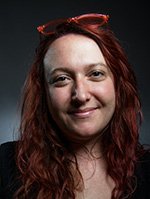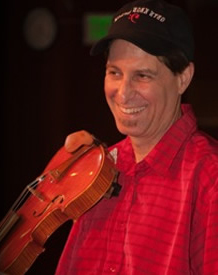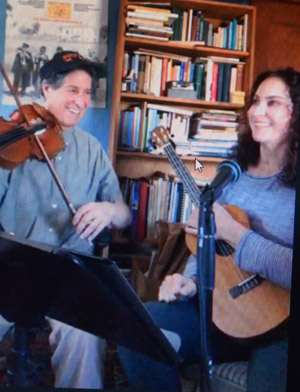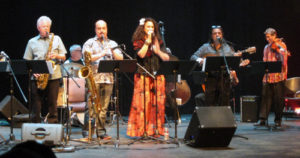By Danielle Levsky


SAN DIEGO — In 1995, Yale Strom presented his documentary The Last Klezmer at the historic Red Vic in San Francisco, shortly after it was shortlisted for an Oscar. The film followed Leopold Kozlowski, a a Jewish musician who went on a journey through Eastern Europe, exploring Yiddish musical traditions in conjunction with his own past as a Holocaust survivor.
At the time, the documentary was already well known and well circulated among American Jewish communities, particularly those in California. As the lights went up in the movie theatre at the close of the documentary, Strom rose from the red velvet seats and walked down the aisle to the screen to lead the audience in a Q&A. He looked out over at his smiling audience, taking in the faces of a predominantly White-presenting and Jewish audience. Strom knew this film would appeal to the predominantly White Ashkenazi Jewish community, but was delighted when in the back, he spotted a sprinkling of folks from other communities looking up at him, looking up at the screen.
After the Q&A, as the audience and creative team schmoozed around the theatre and lobby, Strom started chatting with one of the patrons, a non-Jewish, Black woman, who had specifically sought out the documentary.
He asked how she enjoyed the film, and then ventured to ask her what brought her to see a film about Jewish culture, specifically from Eastern Europe?
“And she said, I came to see this film because Leopold’s story is about the human condition. I understand that your people, and our people, that we have suffered, and we understand what that means, too.”
Strom stood stunned, and then smiled at the woman.
“You’ve made my day,” he said out loud to her, while thinking to himself: “Now I know I’m doing good work.”

Strom is known in the modern Jewish world, and certainly around San Diego, for his accomplishments as a violinist, composer, filmmaker, writer, photographer, and playwright. He’s conducted significant research in Central and Eastern Europe and the Balkans among the Jewish and Roma communities, as well as toured with his klezmer band Hot Pstromi Trio. They compose their own New Jewish music combining klezmer with Chasidic nigunim, Roma, jazz, classical, Balkan and Sephardic motifs.
This past November, he presented a world-premiere of his play, The Education of Herschel Grynszpan, was inducted into the San Diego Music Hall of Fame, and played at the opening of the new Yiddish cultural center, created in La Jolla by the Yiddish Arts and Academics Association of North America. Now, Strom is working on a new play about the life of the famous Jewish painter, Marc Chagall.
Though the mediums in which Strom tells his stories are numerous, there was a time when he was still exploring how, where, and when he wanted to make his impact on the world.
Exploring every path
Strom grew up in Michigan in a conservative, traditional Jewish home. His family preferred to go to smaller, mostly storefront shuls, and there, he was exposed to Yiddishkeit early on.
“I would hear Yiddish being spoken, stories of Eastern Europe,” Strom said. “Many of these Jews were Holocaust survivors. I’m sure this influenced me a lot without me realizing it.”
His family was also quite musical, with classical music being often played in their home. At first, as an 8-year-old, Strom saw violin practice as a way to get out of school once a week.
Eventually, he developed a real love for violin, and at age 12, Strom moved with his family to San Diego when his father, David, accepted a professorship at SDSU.
Upon graduating high school, he started attending SDSU as an undergraduate student, where he continued to be an undeclared major through junior year, until he studied abroad in Sweden. There, he got his first taste of being in Europe. He met Jewish people from other parts of the world and other minorities, and even led a seder in Uppsala, Sweden. He also learned Scandinavian, classical, and bluegrass music to play on the violin.
Returning to SDSU, he declared a major in American Studies, and picked up as many humanities classes as he could, including Jewish culture and Jewish history. Throughout his studies, he continued to play violin. He then went on to get a second Bachelor’s Degree in Furniture Design pursuant to a decision to work with his hands and to create music, wherever his career might take him.
“Music was certainly the flashlight”

Ultimately, furniture design did not pan out, and Strom was in the midst of applying to law school. In between applications, he dug through his family’s record collection, stumbling upon records of klezmer revival bands. His interest in klezmer began to grow, and he went to see The Big Jewish Band in San Diego.
“Here I am getting ready for law school… and I go out to listen to this music. It’s Jewish, it’s Balkan, it’s Roma. I had such a great time that evening, that when I came home, a light bulb went off,” Strom said. “I love this music; there’s energy, there’s pathos. It can be slow, it can be fast. I’m going to form my own klezmer band.”
Strom started thinking about his repertoire, how he was going to differentiate his band from other klezmer revival groups. He started thinking about the what he had seen and learned about in Europe, the hidden archives and hidden memories of stories and music.
“So, I bought a one-way ticket to the Eastern bloc,” Strom said. “I told my folks once I got there. I called the law school I was accepted into and told them to give up my spot. And I went down this academic artist’s road with no idea what was on the horizon.”
The music was the first reason for this and subsequent trips. During his travels and investigations, he realized that his interest extended past music: it was ethnographic, it was cultural, it was multitudinal.
“Who were these Jews that returned after the Holocaust, and raised their families in Eastern Europe? What kind of Jewish life did they lead? What kind of cultural, political, and social ramifications did they face? Were they afraid?” Strom reflected. “I didn’t know what road I was going down, but music certainly was the flashlight.”
The rest is his story
Strom eventually returned from Europe with music, history, and stories from Jews, Roma, and musical influences from all over the Eastern bloc. He reconnected with musician colleagues and friends to form what would eventually become the original Hot Pstromi Trio: Jeff Pekarek, bassist and arranger of music, and Fred Benedetti, classical guitarist.
And the rest, as they say, is history. Strom’s initial spark for music and the subsequent research in the Eastern bloc propelled his career forward as a storyteller across a variety of media. He credits his initial findings to Holocaust survivors, who shared their stories with him.
“I feel proud that I kept their stories alive, not only to remember the past, but to extol what they did afterward, to push them into the future,” Strom said. “One day when I do leave the Earth, maybe some of my work will still be around. But I’ll know that I made my mark to open the hearts and minds of people.”
Yale Strom will be performing with his band Hot Pstrmi, along with other international music groups, at San Diego Repertory Theatre’s Winter Schminter concert on Tuesday, December 21 at 7:30 pm. More information is available at sdrep.org.
*
Danielle Levsky (she/her) is an arts and culture writer, clown, producer, and educator based in San Diego whose work features people, ideas, and principles that highlight the experiences of diverse audiences